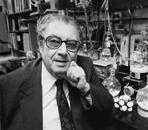Herbert Brown, winner of the 1979 Nobel prize in chemistry, died in December 2004 at the age of 92.

Brown, who was born in London, UK, in 1912, will be best remembered for his explorations of the role of boron in organic chemistry. He discovered that the simplest compound of boron and hydrogen, diborane, adds with remarkable ease to unsaturated organic molecules to give organoboranes. He is on record for noting his parents’ remarkable foresight in giving him the initials HCB.
With organoboranes readily available for the first time, he undertook to explore their chemistry. This chemistry has proven to be unusually rich.
Work on the organoboranes led to the development of the first general asymmetric synthesis of pure enantiomers. ’Professor Herbert C Brown has discovered a new continent in chemistry, a continent that will take many years of enthusiastic research effort to explore in detail and exploit for the good of mankind,’ reads a biography issued by Purdue University, US, where Brown worked from 1947, ending up as R B Wetherill research professor emeritus. His boron research was recognised in the awarding of the Nobel prize in 1979.
Brown’s parents were Ukranian jews who joined a mass migration to England in 1908 (Brown is an anglicised form of Brovarnik). His family moved to Chicago, US, to join his father’s family, but soon found themselves in the depression of 1920. This and his father’s early death in 1926 delayed his academic progress and Brown did not gain his bachelor’s degree, from the University of Chicago, until 1936. He was advised by Julius Stieglitz, then professor emeritus at Chicago, not to leave - as he was about to - but take up graduate work. He gained a PhD in two years but could not find an industrial placement, so ended up as a research assistant still at Chicago. ’I am an unusual example of a chemist who ended up in academic work because he could not find an industrial position,’ he said when he was awarded the Nobel prize. Brown left Chicago for Purdue, where he remained till the end.
His interest in boron chemistry was triggered when his girlfriend, later wife, bought him the book The hydrides of boron and silicon by Alfred Stock as a graduation gift. The book was chosen, he would later tell spellbound audiences, because - at $2 - it was the cheapest in the University of Chicago bookstore.
Brown is survived by his son and wife, Sarah, to whom he was married for 67 years. She wrote in his yearbook when he left Wright Junior College in 1935 that he would one day be awarded the Nobel prize.
Bea Perks






No comments yet